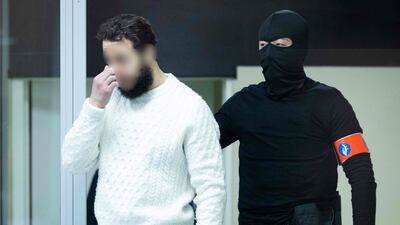The largest criminal trial in Belgium opened on Monday, six years after the 2016 terror attacks which killed 32 and wounded 340 in bomb attacks at Zaventem airport and a metro station.
Set to last seven months, the trial will revive painful memories for those who lost loved ones, were injured or witnessed the twin bombings on March 22, 2016.
The Brussels bombings, claimed by ISIS, killed 15 men and 17 women from Belgium, the US, Netherlands, Sweden, Britain, China, France, Germany, India, Peru and Poland — many of them living in the multicultural, multi-ethnic city that is home to EU institutions and Nato.
Three suicide attackers also died in the blasts.
Ten people will face charges but only nine will be present in court. One of the accused, Belgian citizen Oussam Atar, is believed to have been killed in Syria in a strike against ISIS. If convicted, some of them could face up to 30 years in prison.
Three of the accused, Salah Abdeslam, Mohamed Abrini and Osama Krayem, have already been sentenced for separate bomb attacks in Paris in November 2015, which killed 130.
The prime suspect, Abdeslam, has been sentenced to life imprisonment in France. Prosecutors believe his arrest in Brussels on March 18, 2016, pushed a terrorist cell to strike four days later.
Prosecutors say that Abrini fled the airport without detonating his suitcase of explosives. Krayem, a Swedish citizen, is accused of planning to be a second bomber on Brussels’ metro.
Presiding judge Laurence Massart will confirm on Monday the identity of all parties to the case, including the defendants and lawyers representing about 1,000 people affected by the attacks.
She will then address the jury, selected from a pool of 1,000 Belgians last week in a process lasting 14 hours.
The trial is taking place in Nato's former headquarters. The Belgian state has invested €9.8 million ($10.3 million) to build a courtroom and other necessary infrastructure for the trial, which is estimated to cost at least €35 million.
In accordance with Belgian court procedure, the defendants have not declared whether they are innocent or guilty.
Victims of the attacks have repeatedly complained of feeling abandoned by the Belgian state. Christian Delhasse, a metro driver during the attacks, in October told Belgian radio station RTBF that he has not received a single euro in compensation.
RTBF found that his employer, the STIB, the public Brussels Intercommunal Transport Company, forgot to send an accident report.
Mr Delhasse was alone with the victims after the attacks until the police arrived. He said that he managed to get four people out of the wreck and started helping a woman who was screaming for her baby.
“It was a policeman, who arrived 13 minutes later, who found him. I don’t know what to tell you. It was indescribable!” he said.
About 1,000 people have registered to be represented in the hearings.
“I had a lot of trouble sleeping last night,” Christelle Giovannetti, who now wears hearing aids due to injuries from the metro bombing, said before the trial began.
Sylvie Ingels, who was near the first airport bomb, said she has had nightmares in recent days.
“If I come today it's to make this step and go beyond my fears. It's important to be here. It's their trial but also ours. We are waiting for some answers,” she said.


